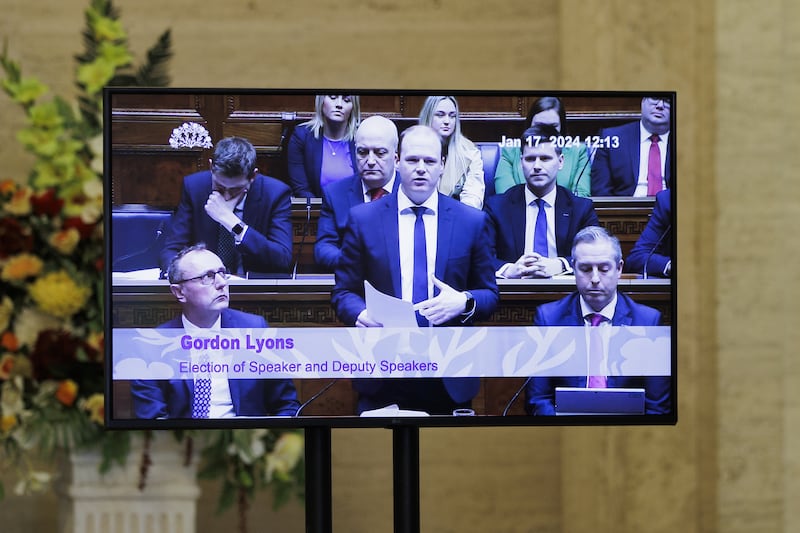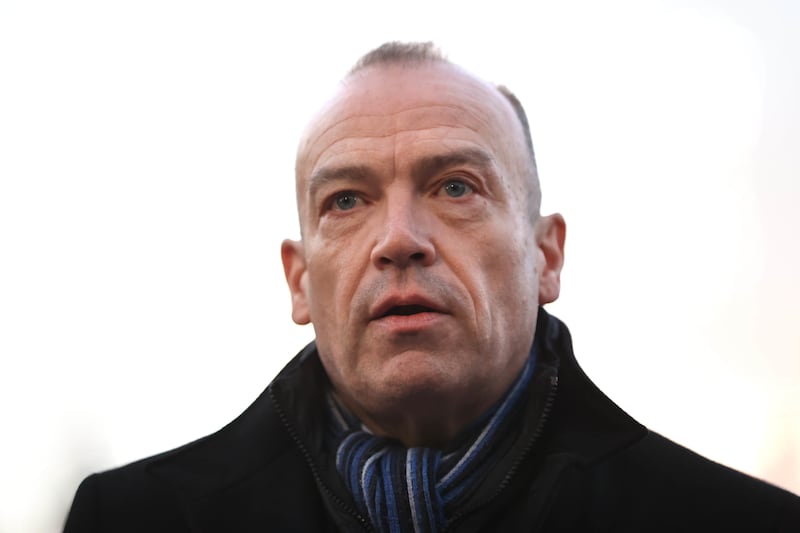I was in Stormont on Wednesday and witnessed the by-now familiar sight of our MLAs filing into the chamber and filing out again, unable to form a government.
We have been here before, but this time it felt different. The DUP MLAs were subdued. Gone was the usual ebullience and chutzpah. Gordon Lyons went through the motions, branding the recall as a cynical stunt. He delivered his script without conviction or belief.
Of course, there was the obligatory sniping at Sinn Féin. These nationalists knew “full well” that there was no prospect of a speaker being elected; they were peddling disinformation and misleading the public. Even the petty point-scoring was deflated. Lyons appeared to be flying blind.

If this is success, I’d hate to see what failure does to their demeanour and body language. As the session went on it was more and more evident that the DUP MLAs were uncomfortable with being set against demoralised, undervalued public sector workers.
Understandably, there is a scant sympathy for these politicians. The fact that they continue to receive a wage while refusing to work is widely viewed as outrageous. Notwithstanding the fact that the DUP are architects of their own misfortune, with one strategic miscalculation after another, it is glaringly obvious these MLAs are supporting actors in a prolonged internal psychodrama. They are far from content. Like most other people they are facing soaring energy prices, car and mortgage repayments and job insecurity. They have been forced to accept a significant cut to their income, yet their party colleagues continue to draw a full salary plus expenses. Inevitably this causes tension and resentment.
Those who are calling the shots are MPs and peers very far removed from the sharp end. The absolutists within the DUP have calculated that the best chance of avoiding a split in the party lies in rejecting the Windsor Framework and, with it, power-sharing. Whatever world they live in its not the same as ours. It is extraordinary that a handful of ultras have been enabled to cast doubt over the future of devolution and power-sharing.
The DUP repeatedly state that they have a mandate to boycott Stormont, and this is rarely challenged. Their 2022 manifesto continued five key election promises: fixing the NHS, growing the economy, removing the NI protocol, helping working families and keeping schools world-class. Yet since 2022 they have focused all of their energies on removing the NI Protocol, a pledge not within their gift.

What of the others? Fixing the NHS? We are moving inexorably towards 500,000 people on a hospital waiting list, GPs are handing back their contracts and we are haemorrhaging staff across health and social care. Thursday’s strike has highlighted the scarring that this boycott has caused to our economy and public sector workers. The moral injury caused by asking healthcare workers to take action that goes against their conscience and core values is hard to overstate.

As any rational actor will acknowledge, the DUP’s seven tests cannot be met. Compromise is the only game in town. Prior to Christmas it seemed as though we were edging towards some sort of light at the end of the tunnel. This momentum has melted away and we have been plunged ever further into darkness.
The Secretary of State has repeatedly stated that the talks with the DUP are over. What is he waiting on? The end of the process should be underlined by the British government with some meaningful intervention.

The negotiations have concluded, the talking is over, he should publish the deal. Put it on the table and let us see what the progress has been achieved.
We have endured almost two years of this political impasse, amid a cost-of-living crisis that continues to push more and more people below the poverty line. During this period the DUP have been allowed to call the shots. At some point in the very near future they are going to have a make a call. Either the deal is as good as it gets, or it does not go far enough.
Stalling, dithering and stringing this out are no longer viable options. This is an existential moment for the party
Stalling, dithering and stringing this out are no longer viable options. The DUP have run out of road. This is an existential moment for the party.
They need to decide if they want to be relevant to the future or cling to shibboleths of the past.



